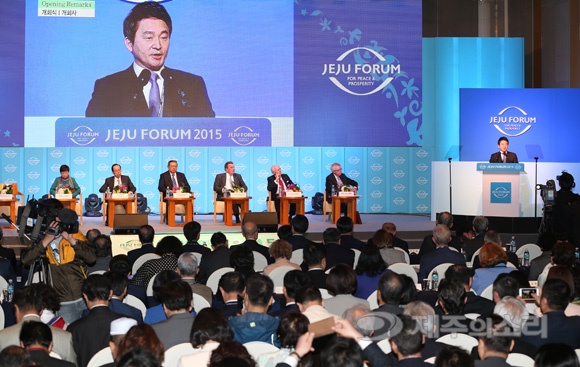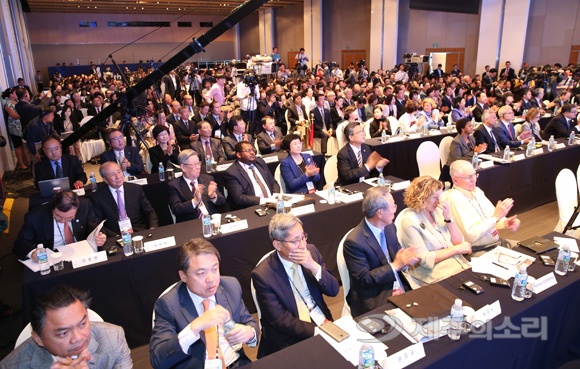| |
 |
|
| ▲ Jeju governor Won Hee-ryong stated his desire to make Jeju a platform for world peace. Photo courtesy Jeju Sori |
The Jeju Forum for Peace and Prosperity held its official Opening Ceremony on Thursday, May 21, as dignitaries delivered keynote speeches on building peace in Asia and beyond.
Jeju governor Won Hee-ryong began by introducing his supposed novel concept of peace, in essence calling for reconciliation, human rights and renewable energy development.
“We are now moving onto a peaceful era where ... healing, tolerance and energy spread peace throughout the world. The historic opening of this new peaceful world will begin right here in Jeju,” said Won.
It was a bold opening in which he reiterated his desire to “carve out a platform for global peace” on Jeju.
That platform, in essence, is the Jeju Forum and the speakers following Won’s address all touched on his three pillars of human rights, reconciliation and sustainable development.
European lessons for Asia?
Former German chancellor Gerhard Schroeder immediately lauded the European project for transforming a continent of warring states into one of cooperating allies, something East Asia might learn from.
“Intense regional cooperation between neighboring states is a preconception for peace and prosperity. I say this as a committed European as it is a lesson we have learned.”
Recognizing the barriers to this in Asia, he suggested beginning with a lower level architecture of cooperation which can “lay a solid foundation for peace, trust and harmony.”
“How to promote trust when there is none? This is not always easy, especially when the trauma of the past is unbearable.”
Former Indonesian president Susilo Bambang Yudhoyono agreed “an architecture of peace” was necessary to help “soften the rough geopolitical edges” in bilateral relations clouded by historical conflict.
Such cooperation, even in times of animosity, slowly chips away “the ingredients of mistrust” between nations, allowing shared values and interests to overcome division.
| |
 |
|
| ▲ The Grand Ballroom was packed for the assembly of former world leaders at the Jeju Forum. Photo courtesy Jeju Sori |
The challenge of dispersed power
Former Japanese prime minister Yasuo Fukuda seemed less hopeful in a conflictual, dichotomous, and divided world after the fall of the bipolar post-Cold War order. The Japanese statesman even saw a clash of civilizations — earlier dismissed by Schroeder — in the arising multi-polar world of diverse power bases.
However, Fukuda saw opportunities opening up for nations such as Korea as the need for mediation increases.
“In the multi-polar international stage ... of the twentieth century we have multiple major powers and many middle powers, and all must cooperate together in order to seek change,” said Fukuda.
Most optimistic of all was former Australian prime minister John Howard, welcoming Asian growth and its role in the ending the “pretense” that communism was ever a viable alternative to capitalism.
Despite fears in the region, Howard felt that China’s growth — and “inevitable increasing influence” — was to be welcomed, although it was not likely to challenge the “basic reality” of American superiority.
“For the foreseeable future the most significant relationship in the region is between China and the US. It is important for all countries to understand that and make contributions to ensure this proceeds in a harmonious and positive light.”
Middle powers at the center
Digging deeper into the role of middle powers, former Canadian prime minister Joe Clark said middle power states have important roles to play due to greater flexibility and widespread distrust of great powers.
“Middle powers matter more today than we once did. As the tension between great powers narrows their focus and limits their capacity to lead, [middle powers are] better suited for mediation and experimentation.”
He reiterated the need for a strong architecture of peace as power disperses around the world as "Smaller and middle powers have a greater need for rules and order.”
Li Xiaolin, president of the Chinese People’s Association for Friendship with Foreign Countries (CPAFFC), was last to take to the stage as she laid out China’s efforts to be a good neighbor through cultural exchanges. Stressing that lasting peace must be built at the people-to-people level, she said cooperation is the key to overcoming differences.
“A good neighbor is better than a brother far away ... Our destiny is intertwined. We should be united as one and we need to help each other [to] realize a dream of building a new Asia with trust and harmony.” |





















